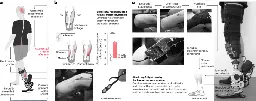Bionic leg makes walking quicker and easier for amputees, trial shows | Patients reported less pain and less muscle atrophy following the pioneering surgery required for control of the bionic leg.
Bionic leg makes walking quicker and easier for amputees, trial shows | Patients reported less pain and less muscle atrophy following the pioneering surgery required for control of the bionic leg.
Enabled by augmented muscle afferents, a bionic leg under continuous neural control restores biomimetic adaptations to various walking speeds, terrains and perturbations.

From the article: A brain-controlled bionic leg has allowed people with amputations to walk more quickly and navigate stairs and obstacles more easily in a groundbreaking trial.
The device allows the wearer to flex, point and rotate the foot of the prosthetic using their thoughts alone. This led to a more natural gait, improved stability on stairs and uneven terrain and a 41% increase in speed compared with a traditional prosthetic. The bionic leg works by reading activity in the patient’s residual leg muscles and uses these signals to control an electrically powered ankle.
“No one has been able to show this level of brain control that produces a natural gait, where the human’s nervous system is controlling the movement, not a robotic control algorithm,” said Prof Hugh Herr, a co-director of the K Lisa Yang Center for Bionics at Massachusetts Institute of Technology (MIT) and the senior author of the study.
“Not only will they be able to walk on a flat surface, but they’ll be able to go hiking or dancing because they’ll have full control over their movement,” he added.
Herr is himself a double amputee, having lost both legs to severe frostbite after being caught in a blizzard during a rock climbing trip in 1982. Despite having his original amputations decades ago, he hopes to have revision surgery to be able to benefit from a pair of similar bionic legs in the future.
“I’m thinking of doing that for both of my legs in the coming years,” he said.
In the trial, published in Nature Medicine, seven patients were given the bionic leg and compared with seven patients with traditional amputations. Patients reported less pain and less muscle atrophy following the pioneering surgery required for control of the bionic leg, which preserves natural connections between leg muscles. The patients were also more likely to feel that their prosthetic limb was part of their body.